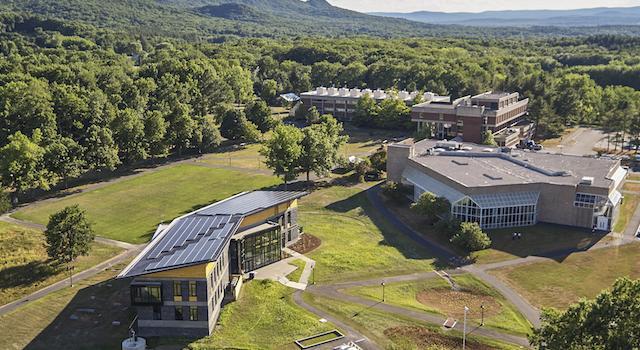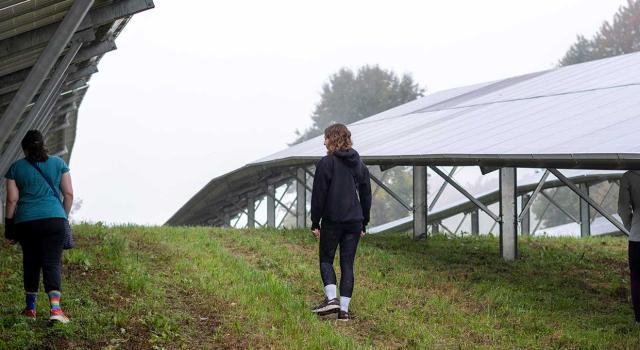Getting Off the Grid Through the R.W. Kern Center Solar Challenge Initiative

The R.W. Kern Center, Hampshire College’s new living building, is designed to produce more electricity than it uses. A solar array atop the roof will be the primary means of generating that energy, and the R.W. Kern Center Solar Challenge Initiative began this week to raise a total of $276,000 toward its installation.
Sparked by an $80,000 gift from the Tern Foundation’s TernSOLAR Challenge Grant Program and a $58,000 gift from an anonymous donor, the goal of the Solar Challenge Initiative is to raise an additional $138,000 to match their donations.
“We’re so very honored to support Hampshire in the development of the R.W. Kern Center,” says Marianne Lampke 77F, co-director of the Tern Foundation. “Once again, Hampshire is paving a path toward innovation, transformation, and social responsibility. The Kern Center promises to serve as an international visionary spotlight and an important learning model for rigorous sustainable-building standards. Our support of the solar-panel system fits perfectly with our vision to invest in renewable energy to benefit nonprofit organizations that engage creatively and strengthen the communities they serve.”
The Kern Center will provide multifunctional learning, teaching, and exhibition space and also house the admissions office. The College intends to pursue Living Building Challenge (LBC) certification, which calls for the creation of a net‑zero energy, waste-disposal, and water-consumption building and other exacting criteria. There are currently only five fully certified LBC-certified buildings in the world, and Hampshire will provide national leadership at the confluence of architectural design and energy and water conservation.
A long-term strategy to reduce the College’s reliance on the electrical grid lies in the Kern Center’s 6,210-square-foot solar installation. Working with Pioneer Valley Photovoltaics (PV2), a local cooperative based in Greenfield, the new rooftop system will produce more electricity than the building uses.
“Our buildings should teach in themselves, so that people who come to Hampshire see who we are and what we do,” said Jonathan Lash, president of the College. “Constructing Kern to be sustainable makes you wonder why buildings are built any other way. We’re so grateful to everyone who contributes to this ambitious project.”
Tern Foundation is a small private foundation launched in 2010. Their mission is to support programs and organizations that embrace creativity and collaboration as a means to positively impact local communities. TernSOLAR is Tern Foundation’s premiere environmental initiative, providing funding assistance for solar panel installations within Massachusetts, offered to nonprofit organizations that engage creatively and strengthen the communities they serve. Structured as a challenge grant, the program promotes public awareness by providing an opportunity to engage and educate communities on the many benefits of sustainable design and building practices in conjunction with solar power as a renewable energy option.



